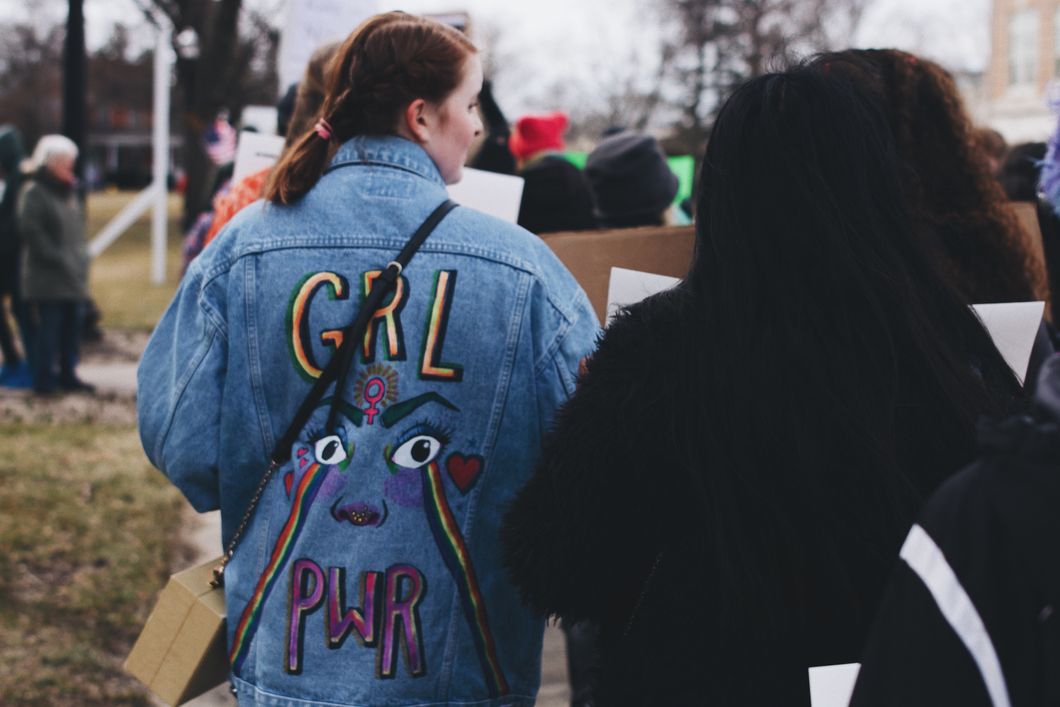I had never been to a demonstration or any kind of protest before, so going into this march I wasn't sure what to expect. I have some experience with domestic violence and sexual violence whether it be me, family member(s), or friends.
With that being said, I find this topic to be close to home and something I would say I am passionate about. I wholly believe that if anybody at any time has been a victim, they should be able to tell their story and get the help to deal with the situation and following trauma. If part of their healing process is to file charges, etc. then they should be able to do that as well.
As I have gotten older and started to actually pay attention, I have seen this become a very hot button topic due to political candidates and other elected officials.
Let's get to the good stuff though. The SlutWalk originated in 2011 in Toronto, Ontario after an officer had implied that a woman had been sexually assaulted because of the clothes that she had been wearing. This inspired people internationally to stand up against rape culture and victim blaming. The first demonstration on UConn's campus was the same year.
Two alumni of UConn brought the march to campus after they had been involved with or had been victims of sexual assault. During a speaking session of the march, they explained this and that five of their mutual friends had all been victims and they were appalled by how the University had handled it. With help from their demonstration and avocation of their own, they were able to get the university to rewrite their policies about reports of sexual assault and make them less judgmental and critical of the victim.
The march started with a brief overview of the agenda of the march. It started with a quick 15 minute walk around campus with chants, speakers from multiple organizations, and then a platform for those that were victims to speak to their experiences.
Nothing was more powerful than listening to survivors tell their stories and reclaim their empowerment themselves. There is also a dangerous stigma that only women get assaulted and this bluntly just isn't true. One man had the courage to tell over 100 other strangers his experience with sexual abuse and how he was able to handle the trauma.
This story in culmination with other survivors that were able to speak out, left me reflecting on how strong they are to be able to go through abuse and advocate for themselves seeking help to deal with the trauma and hold people responsible for their actions. Within my reflection, I felt empowered.
The passion of the people that organized the event for getting justice and having an open, safe space for survivors to discuss their trauma made me realize no matter what the issue, I can be an advocate and stand among the survivors in solidarity.
With this knowledge, I plan to be more active and participate in more demonstrations and marches not just for their political intent, but for supporting my fellow activists and the changes that we can make in our universities, local community, and the national level.



 StableDiffusion
StableDiffusion
 StableDiffusion
StableDiffusion
 student thinking i shouldnt have procrastinated all semester
StableDiffusion
student thinking i shouldnt have procrastinated all semester
StableDiffusion
 Photo by
Photo by  Photo by
Photo by  Photo by
Photo by  StableDiffusion
StableDiffusion
 StableDiffusion
StableDiffusion
 Photo by
Photo by  Photo by
Photo by 


 Lumiere figure at the Disney Store at the Ala Moana Shoppi… | Flickr
Lumiere figure at the Disney Store at the Ala Moana Shoppi… | Flickr








 StableDiffusion
StableDiffusion StableDiffusion
StableDiffusion 10. Extra BlanketsJuwenin Home 100% Cotton Knitted Throw Blanket
10. Extra BlanketsJuwenin Home 100% Cotton Knitted Throw Blanket StableDiffusion
StableDiffusion StableDiffusion
StableDiffusion File:Kishlaru familie.jpg - Wikimedia Commons
File:Kishlaru familie.jpg - Wikimedia Commons Photo by Hanna Balan on Unsplash
Photo by Hanna Balan on Unsplash StableDiffusion
StableDiffusion black blue and yellow round illustrationPhoto by
black blue and yellow round illustrationPhoto by 













